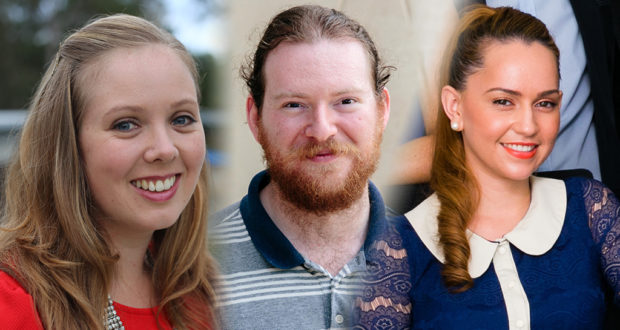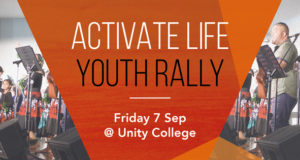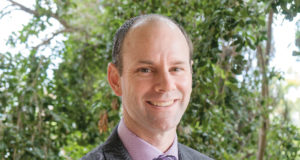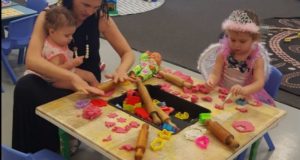Journey asked three young Uniting Church members for their radical game-changing idea to create a vibrant contemporary Christian community. Here’s what they said.
Joshua Harbort
My name is Joshua Harbort, I attend Rosewood Uniting Church and I am a PhD student at the University of Queensland in the field of biophysics. Besides my interests in the future of church and science, I have an interest in traditional Western church music and play music up the front for services at Rosewood.
I think going back to Jesus’ model of discipleship and mentoring is not only beneficial but crucial. Contemporaneity and vibrancy will come if we listen to people and their needs, passions and ideas; what we really have trouble with is mentorship, discipling.
Discipling isn’t just about doing Bible studies. Discipleship is about giving someone a “father in Christ” (1 Corinthians 4:15-17), a mentor who walks the road of life with someone and encourages them to do the same for someone else.
Is our current method of discipleship really the best, sending along ministers to oversee the whole of a congregational organisation? Or should we be sending mentors to areas to mentor a small group of people, who then mentor people themselves, like with Jesus and his disciples?
What if ministry was less about sending an ordained person to officiate liturgy, and more about sending someone to be a friend and guide to individuals? What if going to a theological college for ministerial training was less about trying to get more ministers to look after our congregations and more about those mentees going to college to learn more about the Good Life and about being mentors themselves, so they can lead their own small group of disciples?
And if we really care about mentoring people, we will listen to them, their needs, passions and ideas—and we won’t be able to help being contemporary and vibrant.
Julia Munkas
My name is Julia Munkas and I am one of the leaders of Gen2 at Logan Central Multicultural Uniting Church. Gen2 is a community which strives to engage the youth, young adults, young families and the young at heart from diverse cultures in fellowship, worship and community. Our cultures include Samoan, Tongan, Papua New Guinean, Argentinian as well as Australian and we encourage and foster cultural awareness by incorporating our languages and practices in worship and fellowship.
When asked “What would be a radical, game-changing idea for the church to create a vibrant contemporary Christian community?” I found myself challenged. Depending on the individual, you could interpret the term “radical” or “game-changing” quite differently but I guess therein lies the beauty of it all—the difference. We can learn so much about each other through our differences just by listening with an open mind and heart and living in community together.
Words have a powerful ability to give life or snuff it out and we have all, at one point or another, experienced the side effects of both. So, how are you expected to respond if the word spoken is foreign to you? Whether it’s another language or an un-relatable demographic, the issue remains the same … if we don’t understand the meaning behind it, how can we hope to get anywhere?
My hope and prayer is that we as a church make a conscious choice to better understand and embrace our cultural diversity and express it to the world.
Jo Scarlett
My name is Jo Scarlett and I’ve been worshiping at Oxley Uniting Church for the past nine years since moving from Cardwell in Far North Queensland. I work as a teacher aide in a small school, so it’s no surprise that my passion in the church is for young people. My role is youth and children’s ministry area coordinator; I help run most of our youth and children’s activities along with our families’ pastor. I’ve been on the church leadership team for several years and have attended two Synods which I thoroughly enjoyed.
Would it be radical to suggest that the secret to a vibrant contemporary Christian community is to be a Christian community in these contemporary settings? It may seem simple but we still have so far to go.
By fostering community in our own churches and in the larger church we can see God’s ministry grow. No more generation gaps but all working together to extend the great work of Jesus. The older members of the congregation mentoring the younger members, sharing the wisdom and raising them up to be not only the “future of the church” but “the present” also.
We need to encourage people and make them feel comfortable to share their ideas and to participate. Australia is a diverse country and if we are to continue Christ’s work here we need to be willing to listen to and include all his followers. No more “this church” and “that church”, but all churches working together to build each other up. Let’s share resources and encourage each other. Churches will be vibrant when people feel they can connect with God and others.
Let’s face it, the world is not the same today as it was 40 years ago. We need to keep the foundations strong but also adapt to make it suited to the age we now live in. Most people will not just walk through the front door of a church on a Sunday morning.
That’s why outreach activities are important; they give us the opportunity to meet people where they’re at, to show the love of God by merely loving them like Jesus would. We live in such a busy and self-focused world that we need to take time to stop and pay attention to those around us in our church and the local area if we are to create vibrant contemporary Christian communities.
 JourneyOnline
JourneyOnline







